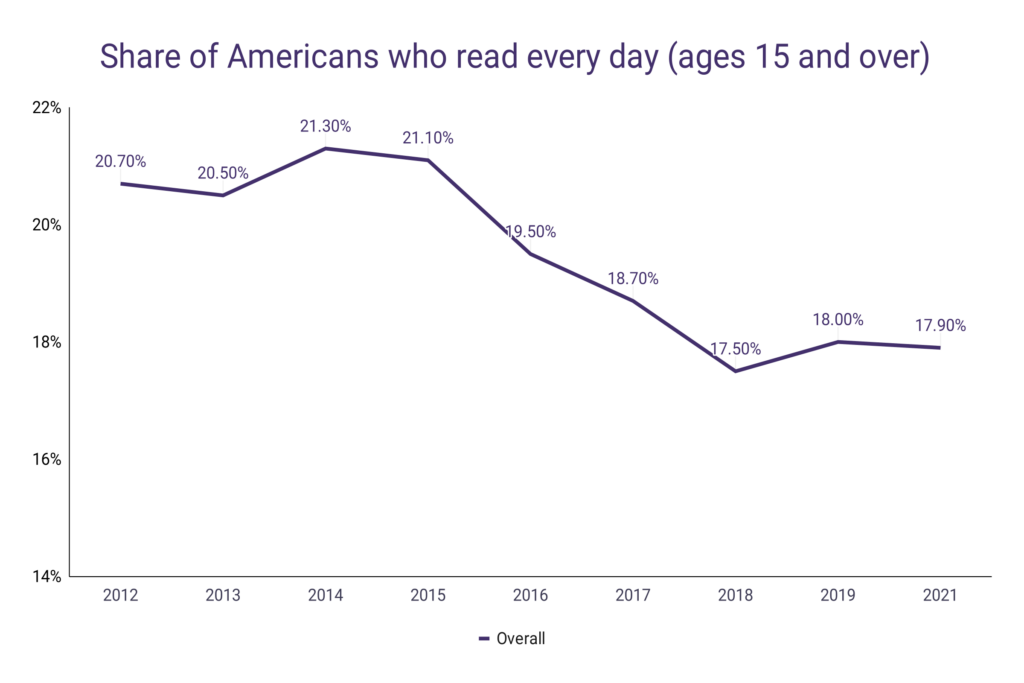Reading every day can provide numerous advantages to individuals that are able to do so over a prolonged period of time. Alongside other benefits, reading allows learners to develop their cognitive abilities, grow their knowledge and enrich their vocabulary.
- 15 minutes of daily reading can make people feel 69% more accomplished, 55% more relaxed and 33% happier.
- 30 minutes of reading can lower heart rate, blood pressure and reduce feelings of psychological distress.
- A further study found that stress levels can be decreased by 68% by reading for just 6 minutes a day.
- Compared to non-readers, regular readers have on average been found to have around a 50% increase in both vocabulary and fact-based knowledge.
- Seniors who read every day saw their cognitive functions improve over a 6 month period.
- Achieving good grades at the age of 16 can be increased by 90% from just 10 minutes of reading every day.
- Although daily reading habits often decrease as teenagers become older, they are able to read for longer periods of time.
- A daily reading habit can increase a student’s likelihood of graduating by 22%.
- 44% of US adult readers read for fun each day.
- To hit a daily target of an hour with books, most people would just have to reduce their screen time by a third.
How daily reading affects learning
A daily reading habit can encourage continuous learning in readers, stimulating their minds and keeping them receptive to new sources of information.
- Students who read for 20 minutes daily are exposed to around 1.8 million words annually.
- On standardized tests, they are more likely to score in the 90th percentile.
- Even reading 1 million words annually can put children in the top 2% of readers for their age.
- Children whose parents read to them frequently are 3 times more likely to be frequent readers themselves.
- Daily teacher read-alouds can increase the amount of time that students spend silently reading to themselves.
- Daily read-alouds can also increase the enjoyment of silent reading.
- 77% of children and teenagers believe summer reading will help them during the school year.
- Over 80% of teenagers do not read for pleasure on a daily basis.
- The 8-12 age group average screen times of over 4.5 hours but only 29% read books for fun daily.
Student reading growth from reading every day
- Less than 15 minutes of daily engaged reading time is shown to have a negative effect on a student’s reading growth.
- However, a minimum of 15 minutes daily engaged reading time is shown to have a positive effect on a student’s reading growth.
- The biggest gains were seen from students that read for between 35 and 64 minutes.
| Engaged reading time | Student reading growth (normal curve equivalent gain) |
| 1 to 4 minutes | – 0.85 |
| 5 to 14 minutes | – 0.15 |
| 15 to 24 minutes | + 0.31 |
| 25 to 34 minutes | + 0.44 |
| 35 to 44 minutes | + 0.48 |
| 45 to 54 minutes | + 0.48 |
| 55 to 64 minutes | + 0.48 |
| 65 minutes + | + 0.38 |
A graph is given below to show how daily reading time affects student reading growth (normal curve equivalent gain):

How number of books at home affects reading frequency (ages 8-18)
For children and teenagers, a link has been shown between an increased number of books in the home and an increased percentage of daily readers.
- 15.90% of children and teenagers with less than 10 books at home read daily.
- However, 49.00% of children and teenagers with 100 or more books at home read daily.
- Children and teenagers that rarely or never read are only more common than those that read daily only if their home contains 1 – 10 books.
| Number of books at home | Read daily | Rarely or never read |
| 1 to 10 books | 15.90% | 19.50% |
| 11 to 20 books | 22.40% | 11.10% |
| 21 to 50 books | 31.00% | 8.40% |
| 51 to 100 books | 38.70% | 8.20% |
| Over 100 books | 49.00% | 6.20% |
A graph is given below to show how the number of books at home affects reading frequency:

How ownership of own-book affects reading enjoyment and frequency (ages 8-18)
Whether or not a child or teenager owns their own book can have a significant impact on their attitude towards reading, in addition to the amount of time they spend on the hobby.
- 30.50% of children and teenagers that own at least one book of their own report that they read daily.
- This drops to 10.10% for those that do not own at least one book of their own.
- 51.50% of children and teenagers that own at least one book of their own report that they enjoy reading.
- This drops to 17.40% for those that do not own at least one book of their own.
| Own their own book? | Read daily | Enjoy reading |
| Yes | 30.50% | 51.50% |
| No | 10.10% | 17.40% |
A graph is given below to show how owning a book affects reading enjoyment and frequency:

How many people read every day?
With the growing impact and popularity of social media, video games and other other entertainment platforms, book reading as a hobby has faced additional competition in the battle for people’s attention spans.
Online users
- A 2017 survey of online users (aged 15 and over) found that 30% read books either every day or most days.
- By including once a week readers, this figure jumps to 60%.
- Of the countries analyzed, China was found to have the highest percentage of everyday book readers (36%).
US readers
- As of 2021, 17.90% of US Citizens (aged 15 and over) read every day.
- Over the given period, the share of US Citizens that read every day declined by 13.53%.
- Only two years in the given data showed an increase in the share of US Citizens who read every day over the previous reported period, 2014 and 2019.

How much does the average person read every day?
As people began spending an increased amount of time on other forms of entertainment with the introduction of new technologies, average times spent reading have steadily declined.
- As of 2021, the average US Citizen (aged 15 and over) spent 16 minutes and 48 seconds reading for pleasure during a typical day.
- Over the given period, the average daily reading time for US Citizens dropped by 15.15%.
- Only two years in the given data showed an increase in average daily reading time over the previous reported period, 2019 and 2021.

How long should you read a day?
With mental and physical health benefits, the hobby of reading is a great way to spend leisure time. Despite this, there are still recommended guidelines to the amount of time a person should spend on the activity.
- Although there isn’t a definitive set time that people must read for, many studies suggest that a daily reading habit of around 15-35 minutes is a good amount of time to aim for.
- Aiming for this amount of time should be achievable for most people and upon reaching 15 minutes, people may be motivated to continue reading for longer.
- When reading for shorter periods of time, the benefits are likely to be reduced due to the time taken to adapt to the activity.
- Reading gains fall below the national average when reading lasts less than 15 minutes each day.
- Coinciding with this, the flow state of mind typically takes between 10-15 minutes to achieve, giving readers a heightened state of focused attention.
- Once the state is achieved, reading comprehension should increase without the expense of as much conscious effort.
- Although the time taken to enter flow differs depending on the person and activity, it generally matches up with the minimum recommended reading time.
How much reading a day is too much?
Even though reading is a hobby with a huge amount of benefits, readers should still be careful not to exceed their daily limitations.
- Over the course of a day, people are not recommended to read for more than four hours.
- During one sitting, people are not recommended to read for more than one hour.
- As reading is an intense mental process, the brain and eyes benefit from periods of rest for reading to continue being productive.
- Additionally, this will help readers avoid problems such as mental exhaustion and/or eye strain.
- As with all hobbies, a good rule of thumb for reading is to note whether or not it is negatively affecting other areas of your life.
- If reading starts to harm a person’s personal relationships, concentration on other tasks, overall energy levels or vision, reading times should be reduced.
Benefits of reading every day FAQ
What are the main benefits of reading every day?
- Reading every day has a huge impact on the human brain.
- The five biggest benefits of reading every day include:
- Knowledge acquisition
- Cognitive stimulation
- Expansion of vocabulary
- Stress reduction
- Improved concentration
- As the benefits of reading every day are cumulative, it is important for readers to be consistent in their reading, regardless of the type of content they are reading.

